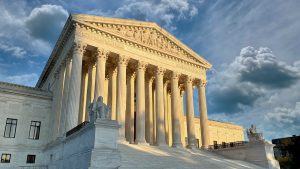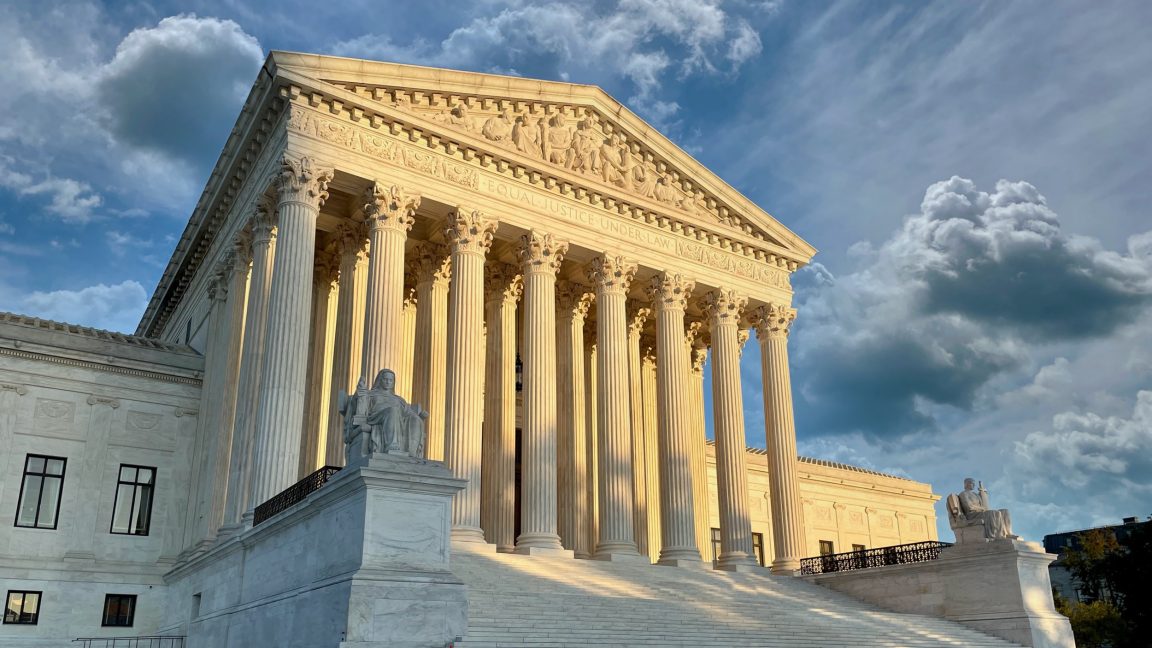- Регистрация
- 17 Февраль 2018
- Сообщения
- 38 866
- Лучшие ответы
- 0
- Reactions
- 0
- Баллы
- 2 093
Offline
Cancer screenings, statins, vaccines, PrEP, will continue to be covered in full.


The Supreme Court. Credit: Getty Images | Douglas Rissing
The US Supreme Court on Friday upheld a key provision of the Affordable Care Act that requires health plans to fully cover many preventive health care services recommended by a federal panel.
The ruling means that tens of millions of Americans can continue getting a variety of preventive services for free under their plans. Those cost-free services include an array of screenings, such as cancer screenings like mammograms and colonoscopies, as well as screens for obesity, lead exposure in children, high blood pressure, diabetes, and some sexually transmitted diseases, to name a few. The free services also include recommended vaccines for children and adults, well-baby and well-child doctor visits, birth control, statins, PrEP HIV prevention drugs, and fluoride supplements and varnishes for children's teeth.
The ruling stems from a lawsuit brought by a group of conservative Christians, represented by Braidwood Management, who objected to having to cover PrEP medication, which they claim can "encourage and facilitate homosexual behavior."
In their lawsuit, the group argued that the federal panel that makes recommendations for preventive services—the US Preventive Services Task Force—does not have the authority to set national policies under the appointments clause of the Constitution. Under that clause, only principal officers, appointed by the president and confirmed by the Senate, or inferior officers under those principal officers, can set such policies. The USPSTF is not either type of appointed officer, they argued.
The USPSTF is made up of 16 medical experts who carefully review scientific data and run models to assess what preventive health interventions are best, using a framework of recommendation gradings from A to F. Any recommendations graded A or B by the task force are required by the ACA to be covered by health plans at no cost to patients.
The US health department argued that the task force members are, in fact, appointed, and under control of the health secretary, a role currently filled by anti-vaccine advocate Robert F. Kennedy Jr.
Two lower courts in Texas sided with the Christian group, saying that the government violated the appointments clause.
But today, in a 6–3 ruling, the Supreme Court disagreed. Chief Justice John Roberts and Justices Amy Coney Barrett, Brett Kavanaugh, Elena Kagan, Ketanji Brown Jackson, and Sonia Sotomayor made up the majority.
Writing on their behalf, Kavanaugh explained: "Task Force members are supervised and directed by the Secretary, who in turn answers to the President, preserving the chain of command in Article II."
While the ruling means that coverage of preventive health care is no longer under threat, the ruling clarifies that the health secretary has direct authority over the USPSTF. The clarification raises concern that the current secretary, Kennedy, could remove task force members and/or undo recommendations to suit his personal ideology, as he is now doing with the vaccine advisory board at the Centers for Disease Control and Prevention.


The Supreme Court. Credit: Getty Images | Douglas Rissing
The US Supreme Court on Friday upheld a key provision of the Affordable Care Act that requires health plans to fully cover many preventive health care services recommended by a federal panel.
The ruling means that tens of millions of Americans can continue getting a variety of preventive services for free under their plans. Those cost-free services include an array of screenings, such as cancer screenings like mammograms and colonoscopies, as well as screens for obesity, lead exposure in children, high blood pressure, diabetes, and some sexually transmitted diseases, to name a few. The free services also include recommended vaccines for children and adults, well-baby and well-child doctor visits, birth control, statins, PrEP HIV prevention drugs, and fluoride supplements and varnishes for children's teeth.
The ruling stems from a lawsuit brought by a group of conservative Christians, represented by Braidwood Management, who objected to having to cover PrEP medication, which they claim can "encourage and facilitate homosexual behavior."
In their lawsuit, the group argued that the federal panel that makes recommendations for preventive services—the US Preventive Services Task Force—does not have the authority to set national policies under the appointments clause of the Constitution. Under that clause, only principal officers, appointed by the president and confirmed by the Senate, or inferior officers under those principal officers, can set such policies. The USPSTF is not either type of appointed officer, they argued.
The USPSTF is made up of 16 medical experts who carefully review scientific data and run models to assess what preventive health interventions are best, using a framework of recommendation gradings from A to F. Any recommendations graded A or B by the task force are required by the ACA to be covered by health plans at no cost to patients.
The US health department argued that the task force members are, in fact, appointed, and under control of the health secretary, a role currently filled by anti-vaccine advocate Robert F. Kennedy Jr.
Two lower courts in Texas sided with the Christian group, saying that the government violated the appointments clause.
But today, in a 6–3 ruling, the Supreme Court disagreed. Chief Justice John Roberts and Justices Amy Coney Barrett, Brett Kavanaugh, Elena Kagan, Ketanji Brown Jackson, and Sonia Sotomayor made up the majority.
Writing on their behalf, Kavanaugh explained: "Task Force members are supervised and directed by the Secretary, who in turn answers to the President, preserving the chain of command in Article II."
While the ruling means that coverage of preventive health care is no longer under threat, the ruling clarifies that the health secretary has direct authority over the USPSTF. The clarification raises concern that the current secretary, Kennedy, could remove task force members and/or undo recommendations to suit his personal ideology, as he is now doing with the vaccine advisory board at the Centers for Disease Control and Prevention.
